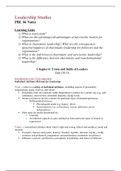Summary
Summary Leadership Studies PBL #6 (Reporting Phase): Narcissistic and Charismatic Leadership
- Course
- Institution
- Book
A 34-page summary of the readings for PBL #6: Narcissistic and Charismatic Leadership of the course Leadership Studies (ECB206) given at Erasmus University College (EUC). These readings include Chapter 6: Traits and Skills of Leaders and Chapter 12: Theories of Charismatic and Transformational Lead...
[Show more]




